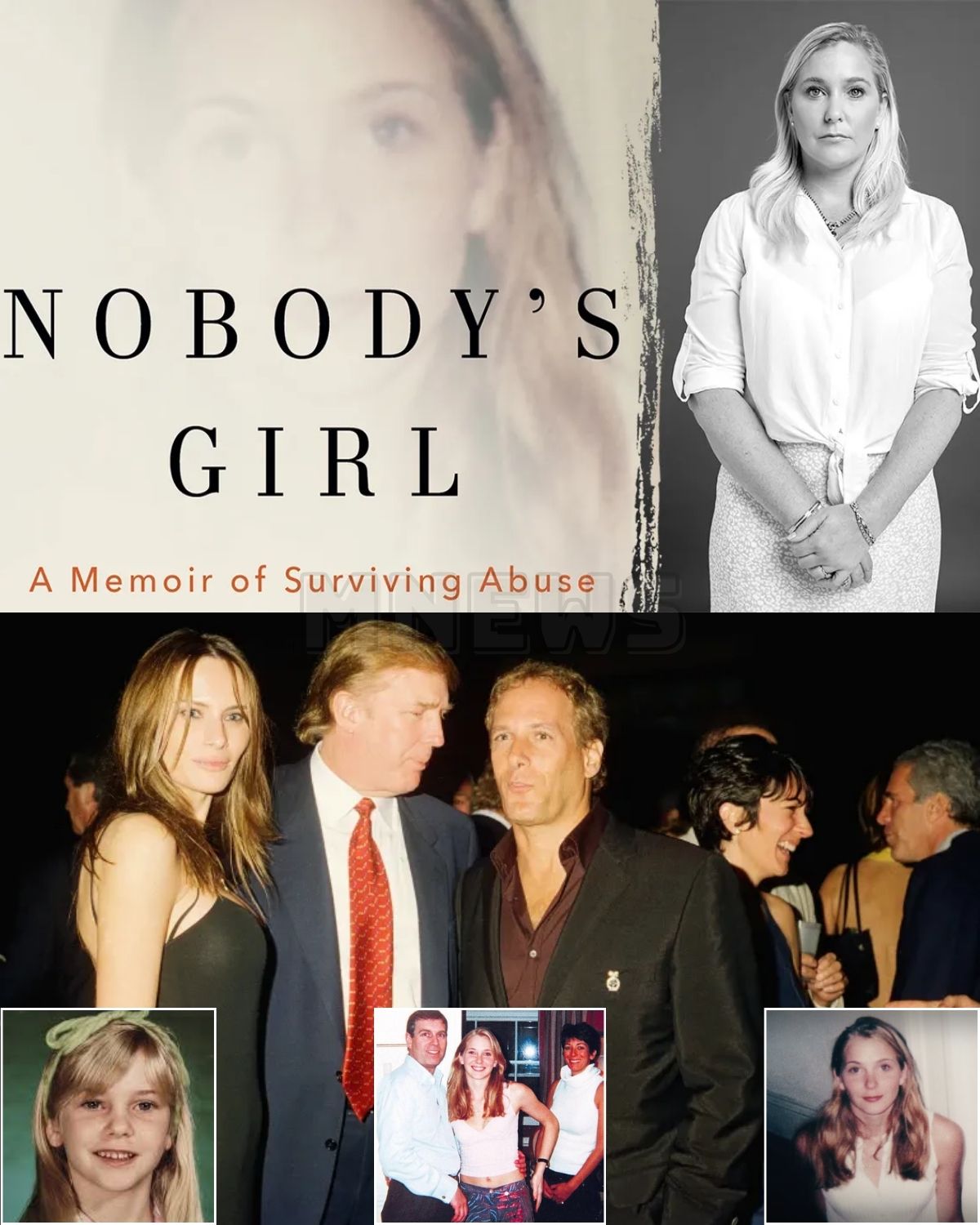
A new book tells the story of Virginia Roberts Giuffre, one of many victims of sex trafficker Jeffrey Epstein. Giuffre died by suicide earlier this year. Her posthumous memoir explores her resilience while also revealing new details about the abuse she suffered at the hands of powerful figures. Amna Nawaz has that story. And a warning, this report includes accounts of sexual abuse and suicide.

Even in death, her voice refuses to be silenced.
Virginia Giuffre — the woman whose name became synonymous with the Jeffrey Epstein scandal — has returned to the public eye in a way no one expected. Her posthumous memoir, quietly titled The Truth That Refused to Die, is not merely a book. It’s a reckoning. A raw, unfiltered confession from beyond the grave that rips apart decades of deception, wealth, and privilege.
For years, Virginia lived under the weight of other people’s power — billionaires, politicians, princes, and media moguls. They wrote her narrative for her: a troubled girl, a confused victim, a fading headline. But with this book, written in her own words and finished only weeks before her death, she seizes it back.
Her story — painfully human, disturbingly political — exposes a world that thrives on silence. And now, that silence has finally broken.
The Woman Who Refused to Disappear
Virginia Giuffre’s name first appeared in the early 2000s when the scandal surrounding financier Jeffrey Epstein began to surface. She was one of dozens of young women — some barely in their teens — who accused Epstein and his network of running a global web of sexual exploitation.
But unlike most, Virginia fought back publicly. She sued, spoke out, and testified — not just against Epstein but against the system that protected him. Her courage made her both a target and a symbol: the survivor who would not disappear, no matter how many lawyers, tabloids, or power brokers tried to erase her.
In interviews, she once said, “They took everything from me — my youth, my dignity, my peace. But they’ll never take the truth.”
Now, those words have become the heartbeat of her memoir.
“They Built Their Empires on My Pain”
The memoir opens with a scene that feels almost cinematic: a young Virginia, barefoot in the hot Florida sun, recruited by a smiling woman who promised her a “dream job.” What followed was a descent into the world of Epstein and his associates — a world of private jets, luxury islands, and unimaginable abuse.
But the book doesn’t dwell on the scandal alone. It turns its gaze toward the men who enabled it — the “untouchables” who stood above the law because they wrote the law.
Without hesitation, Virginia names names. She writes of lavish parties where politicians rubbed shoulders with tech tycoons and princes; of photographs “that were never meant to see daylight”; of favors exchanged in silence.
“They built their empires on my pain,” she writes. “Every smile they gave to the cameras, every speech about morality — I was the cost of that illusion.”
Her tone is neither vengeful nor theatrical. It’s precise, restrained, and chilling. Each chapter feels like a courtroom testimony delivered straight to history itself.
The Cost of Telling the Truth
Before her death, Virginia often spoke about the loneliness of being believed and disbelieved at the same time. For years, powerful figures dismissed her claims as fantasies. Others weaponized her trauma for political gain.
The memoir reveals what that pressure truly felt like. She describes journalists showing up at her door with cameras, friends turning away, and lawyers treating her story like a chess move. “They wanted the soundbite, not the truth,” she writes. “The truth is too heavy. It doesn’t fit in a headline.”
She writes of nights when she couldn’t sleep, when she replayed every conversation with the men who now sit at the heart of international headlines. She admits her fear — not just of them, but of the world’s indifference.
“Silence,” she says in one haunting passage, “was their most powerful weapon. But they forgot — silence dies when you start to speak.”
Beyond Epstein: A System Built to Protect Power
What makes the memoir extraordinary is how it expands the frame. This is not just the story of Jeffrey Epstein or the crimes committed in his shadow. It’s a map of how power itself operates — how wealth, influence, and secrecy intersect to shield the guilty and silence the broken.
Virginia’s book paints a chilling portrait of “circles of trust” — groups of elites who traded access to money, politics, and human lives as if they were currency.
She recalls private meetings in Caribbean villas, offshore accounts, and favors whispered between powerful men over champagne. But she also turns her focus inward, questioning the culture that allowed her to be seen as disposable.
“It wasn’t just them,” she writes. “It was everyone who looked away. Every woman who stayed silent to keep her job. Every man who laughed at the rumors but never asked if they were true.”
Her words are a mirror — and what they reflect is uncomfortable.
The Flash Drive and the “Insurance”
One of the most mysterious aspects of Giuffre’s final months was her possession of what she called “The Insurance.” Friends and investigators have long speculated about a flash drive she kept close, containing evidence — photographs, recordings, documents — that could expose the network surrounding Epstein.
In the book, she addresses it cryptically:
“They thought I kept it to destroy them. I kept it to protect the truth. Because truth is the only thing that doesn’t rot.”
Whether the flash drive exists or not, her message is clear. She wanted the world to understand that truth cannot be negotiated. It can only be told — or buried.
And this time, she refused to bury it.
Death and Defiance
Virginia’s sudden death shocked the world. Found lifeless in her home under circumstances that remain under investigation, she left behind a husband, children, and a manuscript — nearly 400 pages of confessions, evidence, and defiance.
Within days, The Truth That Refused to Die was leaked online, spreading across digital platforms before her estate could even approve publication. Within a week, it became one of the most downloaded and discussed documents of the year.
For those who spent decades suppressing her voice, it was the nightmare they feared most: her story unleashed, unstoppable, immortal.
The World Reacts
Reactions have been seismic. Major news outlets have scrambled to verify the allegations, while social media has erupted in debates over accountability and complicity. Some of the men named in the book have issued statements of denial; others have gone silent.
Protesters have gathered outside courthouses and government buildings holding signs that read “Her Truth Lives” and “No One Above the Law.”
Even political figures who once distanced themselves from the scandal are now calling for independent investigations.
For survivors everywhere, the book has become more than just evidence — it’s validation.
“She gave us the courage to keep fighting,” wrote one survivor of sexual exploitation on social media. “They killed her body, but not her voice.”
The Legacy of a Survivor
Virginia Giuffre’s memoir does not end in despair. Its final chapter — written, according to her editor, just days before her death — reads like a manifesto of survival.
“I don’t want pity,” she writes. “I want change. I want a world where truth doesn’t have to bleed to be heard.”
She urges readers to look beyond the headlines, to question systems that reward silence and punish truth. Her words move between grief and hope, anger and forgiveness — the complex emotions of a woman who saw too much and still believed in redemption.
Her final paragraph is a whisper, but it feels like thunder:
“The truth is not fragile. It doesn’t die with the body that speaks it. It waits — patient, indestructible — for the day someone listens.”
The Truth That Refused to Die
What began as one woman’s personal account has become a public awakening. Virginia Giuffre’s memoir forces society to confront a question it has avoided for decades: How much power are we willing to excuse?
In telling her story, she did what entire systems tried to prevent — she broke the chain of silence.
Even in death, Virginia Giuffre stands as both witness and warning. Her life reminds us that the truth, no matter how deeply buried, has a way of clawing its way back to the surface.
And now, as the world reads the words she left behind, her message echoes louder than ever:
They took everything from me… but they’ll never take the truth.
Because truth — unlike the powerful men who feared it — never dies.
Leave a Reply